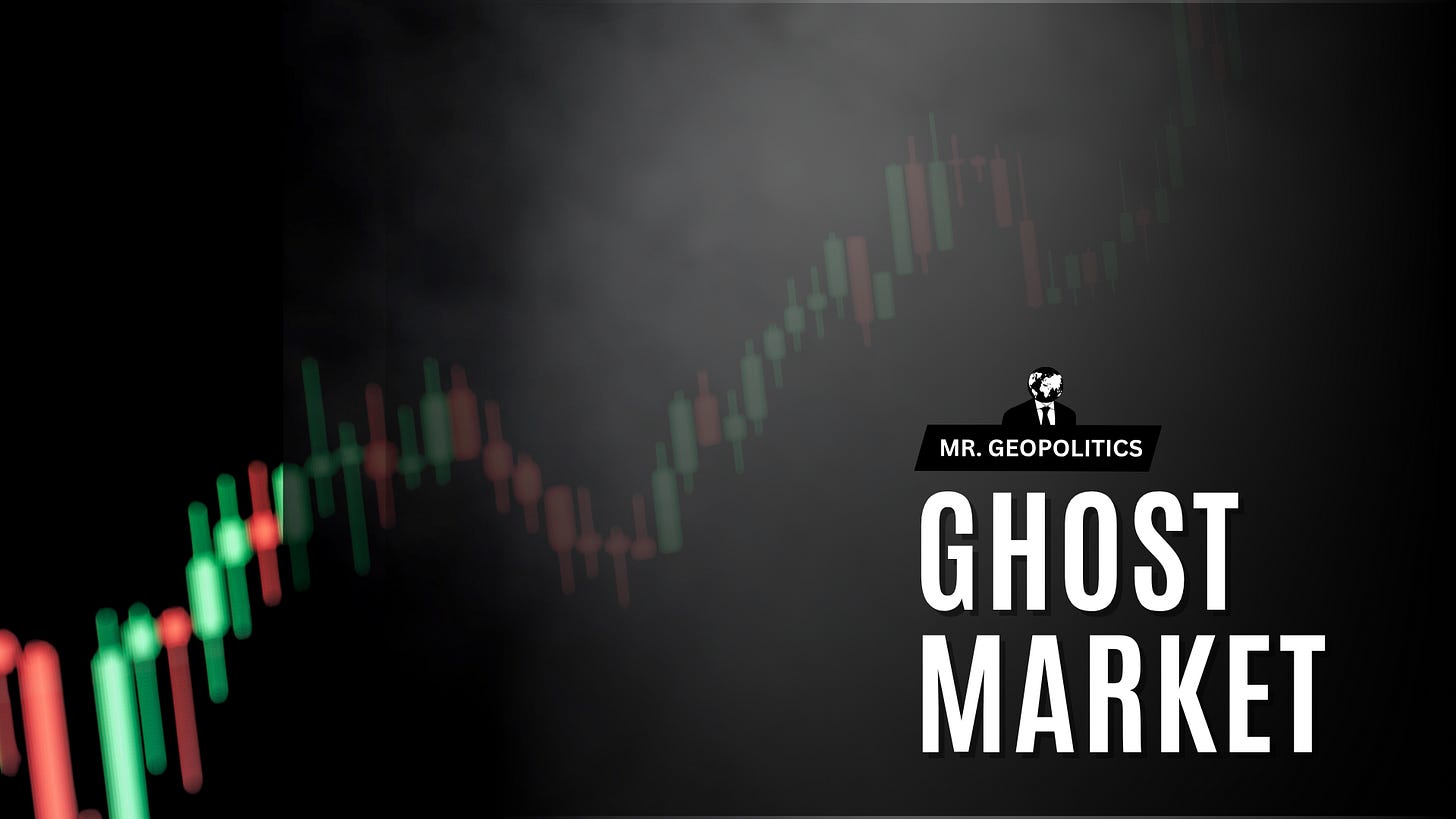Bear, Bull...Ghost?
Why markets are ignoring geopolitics
Days before Donald Trump re-entered the White House in January, the European Banking Authority (EBA) announced it would be “stress testing” its banks to measure their resilience to another geopolitical shock, like the expansion of a war or a major trade fight.
The EBA wanted to see whether a key part of the financial system could weather whatever was to happen next within Europe or outside of it. However, what if the stress test had no meaningful impact—meaning the bank’s stability was not affected by geopolitics?
It would have put Europe and the broader financial world in a strange situation.
Fast-forward several months, and this is exactly where markets seem to be today: unaffected by geopolitics.
Ghost Markets?
The financial world is familiar with bear and bull markets. But what about what I call “ghost markets,” where the effect of geopolitics just seems to pass through commodities, securities, and other equities?
Alarms of this disconnect have been ringing for some time. When the US and China stopped their tariff boxing in April, stock markets rallied, seemingly believing the worst was behind them. Within a few weeks, panic about China weaponizing rare earth supplies would begin. When the Israel-Iran war broke out in June, oil markets surged, but broader equity markets barely budged—a disconnect within the trading world.
Investor Logic
A growing number of government officials around the world have been warning of market complacency. The reality is, markets do not have some kind of geopolitical immunity.
Rather, there are two big reasons why the ghost market is appearing.
First, there is a growing “geopolitical desensitization.”
Investors are no longer spooked by nightmares of the past, like the US and China locked in an economic war (they are) or Israel and Iran trading blows, causing the Strait of Hormuz to be locked down (this almost happened).
All of this is no longer what if. It has occurred, all in a very short span of time.
This kind of “flurry” of events in quick succession changes investor outlooks and sentiment. Suddenly, the US putting tariffs on pharma imports or clashing with Japan over $550 billion in investment pledges does not move the needle.
Second, many have “priced in” the current status quo.
Without saying it, the moves investors are making in the current geopolitical backdrop all scream the same message: we can manage the flare-ups. This is stunning considering the average tariff on Chinese imports is now over 50% (and China’s average tariff rate on US goods is over 30%).
Tariffs are the status quo, and investors are not expecting a return to the pre-tariff era of global trade. In their own ways, stakeholders have calculated, measured, and built in “geopolitical risk” into their portfolios and strategies. Of course, geopolitics is no longer just a risk—and what exists today is but a glimpse of what is to come.
West vs. East
None of this is the best way to manage the world stage. But, in the pursuit of returns, where major structural changes are anathema, this is how many global investors and markets are operating.
Of course, ghost markets are not black and white.
When the India-Pakistan war broke out in May, the Indian stock market lost $83 billion in 48 hours. But the broader market almost ignored the fighting in South Asia. This means that not only are ghost markets forming, but also, pressures on regional equities are not spiraling upward (i.e., Indian shares losing $83 billion was effectively pushed aside in Wall Street, London, and Tokyo).
Geopolitics is delinking exchanges. This also means that investors need to watch out for signs of the opposite: that ghost markets are disappearing, that geopolitics is starting to cause bleeding.
The path forward now is one laid with confusion. Geopolitics is “passing through” markets, like a ghost. Investors are no longer spooked by what is taking place. The big question now is what exactly might cause equities to lose value. But in this question is a profound realization. As geopolitical power shifts East, market power remains in the West. Ultimately, it is really about what will scare Western investors and exchanges. And it could simply be whatever directly exposes their economies, not what happens in the broader world.
-ABISHUR PRAKASH AKA. MR. GEOPOLITICS
Mr. Geopolitics is the property of Abishur Prakash/The Geopolitical Business, Inc., and is protected under Canadian Copyright Law. This includes, but is not limited to: ideas, perspectives, expressions, concepts, etc. Any use of the insights, including sharing or interpretation, partly or wholly, requires explicit written permission.






